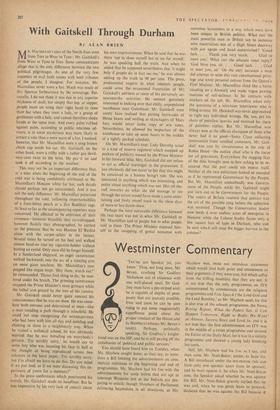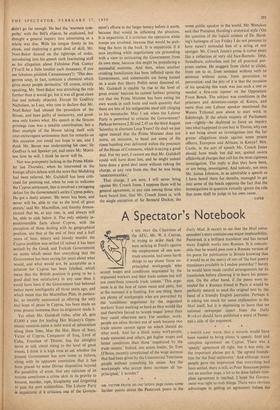Westminster Commentary
'YOU'RE not Speaker yet, you know.' Thus, not long since, Mr. Bevan, crushing Sir Godfrey Nicholson out of existence with one well-placed snarl. Sir God- frey must have a pin-striped soul; he is capable of depths of pom- posity that are scarcely credible. Ever and anon he can be seen rising to put some magisterially superfluous point about the proper conduct of the House and its Members (whence M r. Bevan's You should have heard him on Tuesday, when Mr. Mayhew sought leave, as they say, to intro- duce a Bill limiting the advertisements on com- mercial television to the beginning and end of programmes. Mr. Mayhew had his fun with the advertisements for scalp lotion that are apt to interrupt Westerns just as the Indians are pre- paring to attack; though Members of Parliament delivering haymakers in all directions, as Mr. Mayhew was, must nut introduce statements which would lend both point and amusement to their arguments if they were true, but which suffer from the trifling disability that they are not. It is not true that the only programmes on ITV uninterrupted by commercials are the religious programmes and Free Speech ('the Lord God and the Lord Boothby,' as Mr. Mayhew said), for this is also true of the schools programme, the News, Roving Report, What the Papers Say, It Can Happen Tomorrwv, Right to Reply, We Want' an Answer, Success Story and Look M. and it is not true that the first advertisement on ITV was in the middle of a crime programme and showed the Editor of the Daily Mail, for it was in a variety programme and showed a young lady brushing her teeth.
Still, Mr. Mayhew had his fun, as I say, and then came Mr. Noel-Baker, junior, to have his. A Bill introduced under the ten-minute rule can have, only one speaker apart from its sponsor, and he must oppose it. So when Mr. Noel-Baker rose, the Speaker asked whether he was against the Bill. Mr. Noel-Baker gravely replied that he was and, when he was given leave to proceed, declared that he was against the Bill because it didn't go far enough. He had the 'warmest sym- pathy' with the Bill's objects, he explained, but thought a general inquiry into advertising as a whole was due. With his tongue firmly in his cheek, and deploying a great deal of skill, Mr. Noel-Baker danced on the tightrope of order, introducing into his speech such fascinating stuff as his allegation about Fabulous Pink Camay (`You'll be a little lovelier each daaaaaay, if you use fabulous pminink Camaaaaaaay'): 'This dan- gerous soap, in fact, contains a chemical which gives many people dermatitis.' Of course, strictly speaking, Mr. Noel-Baker was stretching the rule further than it would go; but it was all good clean fun and nobody objected. Except Sir Godfrey Nicholson, as I say, who rose to declare that Mr. Noel-Baker had abused the procedure of the House, and been guilty of insincerity, and good- ness only knows what. His speech in the Strauss privilege case was a notable contribution; but a finer example of the House taking itself with over-extravagant seriousness than his remarks on this occasion you could not hope to see, and I think Mr. Bevan was understating his case; Sir Godfrey is not Speaker yet, and retire Mr. Morri- son how he will, I think he never will be.
Nor was pomposity lacking in the Prime Minis- ter last Thursday, when he intervened in the foreign affairs debate with the news that Mafeking had been relieved. Mr. Gaitskell has been criti- cised for pointing out, when he rose to welcome the Cyprus settlement, that is involved a swingeing defeat for the Government's entire Cyprus policy. He got a dusty answer. 'He never has been, and never will be, able to rise to the level of great events,' said Mr. Macmillan, and thereby demon- strated that he, at any rate, is, and always will be, able to sink below it. The only entirely in- controvertible facts about Cyprus, with the exception of those dealing with its geographical position, are that at the end of four and a half years of hate, misery and bloody murder the Cyprus problem was settled (if indeed it has been settled) by the Greek and Turkish Governments on terms which mean that everything that the Government has been saying for years about what would, and what would not, be acceptable as a solution for Cyprus has been falsified, which mean that the British position is going to be a good deal less satisfactory in any case than it could have been if the Government had behaved rather more intelligently all those years ago, and which mean that the Macmillan Plan, in particu- lar, so recently announced as offering the only real hope of peace in Cyprus, has been made an even greater nonsense than its originator made it.
Yet when Mr. Gaitskell (who, after all, gets £3,000 a year for leading Her Majesty's Oppo- sition) ventures upon a mild word of admonition along these lines, Mac the Hat, Hero of Suez, Victor of Cyprus, Conqueror of Iraq, Lord of Cuba, Freeman of Thurso, has the almighty nerve to talk about rising to the level of great events. I think it is high time to ask whether the present Government has now come to believe, along with its apparent conviction that it has been placed by some Divine disposition beyond the possibility of error, that any criticism of its actions constitutes a crime akin in its gravity to treason, murder, rape, blasphemy and forgetting to pass the port widdershins. The Labour Party is unpatriotic if it criticises one of the Govern- tent's efforts in the larger lunacy before it starts, because that would be inflaming the situation. It is unpatriotic if it criticises the operation while troops are involved, because that would be stab- bing the boys in the back. It is unpatriotic if it says anything while negotiations are proceeding with a view to extricating the Government from its own mess, because this might be prejudicing a successful outcome. And then, when another crushing humiliation has been inflicted upon the Government, and somersaults are being turned on a scale that Harry Pollitt never dreamed of; Mr. Gaitskell is unable `to rise to the level of great events' because he cannot forbear pointing out that the Prime Minister has been eating his own words in such haste and such quantity that there are bits of his indigestible meal still clinging to his moustache. May I ask when the Labour Party is permitted to criticise the Government? Perhaps between 2.30 and 2.45 on the third August Saturday in alternate Leap Years? Or shall we just agree instead that the Prime Minister does not scorn, on occasion, to hand out some of the ripest humbug ever delivered within the precincts of the House of Commons, which is saying a good deal. For my part, I cannot see that Mr. Gaitskell could well have done less, and he might indeed have done a good deal more without risking the charge, at any rate from me, that he was being unstatesma n like.'
That charge, I am sure, I will never bring against Mr. Creech Jones. I suppose there will be general agreement, at any rate among those who have heard him, that Mr. Creech Jones is, with the single exception of Sir Bernard Docker, the worst public speaker in the world. Mr. Mencken said that President Harding's oratorical style ('On the question of the logical content of Dr. Hard- ing's harangue of last Friday I do not presume to have views') reminded him of a string of wet sponges. Mr. Creech Jones's prose is rather more like a collection of very old face-flannels: limp, threadbare, colourless and for all practical pur- poses useless. He staggers from cliche to cliche, from urn to er, from sentence without verb to sentence without noun, from peroration to peroration; and the pity of it is that the occasion of his speaking this week was just such a one as needed a first-rate opener on the Opposition Front Bench. The subject was conditions in the prisoners and detention-camps of Kenya, and more than one Labour speaker mentioned the Waters Tribunal now about to start work in Edinburgh. If the whole majesty of Parliament can—rightly—be deployed to force an inquiry into what happened to one boy in Thurso, why can it not bring about an investigation into the far graver allegations made against some prison officers, European and African, in Kenya? Mrs. Castle, in the sort of speech Mr. Creech Jones should have made but did not, quoted sworn affidavits of charges that call for the most rigorous investigation. The reply is that they have been, or are being, investigated. And nobody, not even Mr. James Johnson, in as admirable a speech as I have heard there for months, managed to get into some of the heads opposite the fact that the investigations in question virtually ignore the rule that none shall be judge in his own cause.
TAPER



































 Previous page
Previous page